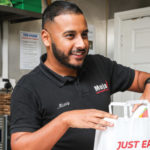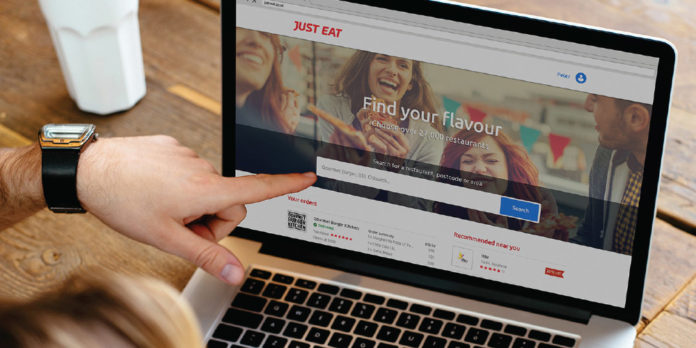Technology is revolutionising the takeaway food market. Just Eat director Robin Clark – who is the keynote speaker at this year’s Better Wholesaling Summit – tells Martyn Fisher how wholesalers can benefit.
BW: What is Just Eat?
RC: Just Eat is the online portal for restaurants. We provide tech, marketing and compliance advice for restaurants. But, most importantly, we provide customers and orders. We began in Denmark in 2001 and came to the UK in 2006. Now, we are at the top end of the FTSE 250, pushing the FTSE 100 mark, with a value of £4.5-5bn, depending on share price. We have about 28,000 UK restaurants on the platform, out of a delivery market of 32,000.
We think the delivery market is worth about £6.1bn, of which £1.7-2bn goes through Just Eat. We like to say that our nearest competitor is the phone, which probably still accounts for 45-50% of orders. About 20-30% of the restaurant’s business then tends to go through us.
What is your role at Just Eat?
 I head the restaurant services division, which helps our restaurants – 99% of which are independents – to find products and services at a price that they couldn’t find anywhere else. Clearly, food and drink is their biggest cost and so we struck a deal with Booker Wholesale – if you spend an average of £1,000 a week with Booker, you will get 7% cash-back, which is a great carrot to grab onto.
I head the restaurant services division, which helps our restaurants – 99% of which are independents – to find products and services at a price that they couldn’t find anywhere else. Clearly, food and drink is their biggest cost and so we struck a deal with Booker Wholesale – if you spend an average of £1,000 a week with Booker, you will get 7% cash-back, which is a great carrot to grab onto.
So we are helping our restaurant partners with a part of their business that has nothing to do with us – it’s all about the value of being a partner with Just Eat. We have motorbike insurance deals; we have Wi-Fi and Sky TV deals; and we have financial-technology deals, because getting a loan in this market is difficult. We also have an ecommerce platform where we sell takeaway packaging at heavily subsidised rates and we do co-branded printed menus, too. The most important bit? We already have restaurants saving more than they pay us in commission. That’s the holy grail, right?
How has disruptive tech transformed the food and drink takeaway market?
Completely. If you look back three or four years before we had heavy market saturation, orders weren’t taken online. About 50% of our partners have English as a second language, so communicating on the phone in a busy restaurant is difficult and inefficient. Running a platform for consumers to see all the restaurants near them has given them a huge range of choice, and has given our restaurant partners the opportunity to trade online efficiently, effectively and safely with trust. It has revolutionised the market.
How else has Just Eat changed the way in which consumers connect with takeaway restaurants?
We were a trusted partner of Amazon to launch Alexa, its virtual assistant software agent. This was after Amazon came to us and asked, ‘How can we have an app on Alexa that enables the customer to order takeaways just through voice?’ Video gamers can now also order ‘in-game’ via Just Eat on Microsoft’s Xbox console.
How much value has tech added to the food and drink delivery market?
The food delivery market is growing 6-8% a year. That’s faster than areas such as retail or traditional food and drink areas. Perhaps the tech has enabled this to grow at a faster rate. Not only that, but it has likely given some restaurants oxygen and orders that they didn’t have before.
But it’s quite difficult to put a figure on it. For instance, two years ago, the food takeaway market was worth only £5.5bn.
Tech is also driving efficiencies in restaurants. Some are now setting up what we call ‘dark stores’, where they operate in a warehouse. The orders just turn up through a printer. It’s highly efficient.
The big thing in the SME market is trust and change. Trying to persuade people to change and do something differently is really difficult. I was speaking to a restaurant owner recently who has just taken over from his parents. They had been running the restaurant for 16 years, but he has only just put it on Just Eat. He loves it. It’s driving volume like he’s never seen before, and as a result, he can make his business more efficient, he can do different cuisines and he’s now thinking of setting up another restaurant next door.
What benefits has your partnership with Booker delivered?
Food wholesale is a complex market. About 75% of it is tied up in the top 10 players. Out of those, maybe only three or four have delivery, cash & carries and possibly even refrigerated trucks. Perhaps three or four are running at negative EBITDA (earnings before interest, tax, depreciation and amortisation) rates. Only one has more than 150 shops, and only one can claim to be within 20 minutes of every takeaway in the UK.
So, it was a natural fit, and Booker is hugely engaged. They have been very supportive, and have given us a lot of insight into how best to work with them.
What other plans in relation to wholesale has Just Eat got lined up?
Lots of brands are really interested in doing deals for Just Eat partners. That’s a natural next step to think about and it is really exciting. Any brands relevant to our restaurants and our customers will be brands that we start talking to.
In what areas can wholesalers improve to better support their foodservice customers?
 Tech and marketing. I love what JJ Food Service has done with its app, but most of the restaurant partners I visit spend the morning trailing around up to six different depots to get what they believe is the best price at that point in time. It’s nuts.
Tech and marketing. I love what JJ Food Service has done with its app, but most of the restaurant partners I visit spend the morning trailing around up to six different depots to get what they believe is the best price at that point in time. It’s nuts.
I don’t understand why the market hasn’t consolidated. I also don’t understand why wholesalers don’t market well to their customers – the restaurants have no updates about some of the deals they run.
On top of that, why are more wholesalers not running their own apps – ones that replicate consumer online shopping apps? It’s a huge opportunity and in a minute, someone will come along with an app and turn it all upside down.
What forms of tech should wholesalers be embracing to help their customers?
It’s always about stock management. The longer you leave in an old, embedded tech system, the more it will cost you.
Why do the likes of Tesco find it so difficult to make online pay? It’s because they are stuck with legacy systems – it is disruptive to a business to replace an old system and the replacement will be difficult to embed because embedding new technology is fraught with problems.
But the flip side is that it will happen at some stage. And if you are not agile and nimble, there will be gamechangers that come along and significantly change it.
What is the outlook for the food and drink takeaway market?
 The headlines are terrible – restaurants face a cocktail of rising costs, Brexit, business rates going up, increased competition, legislation affecting how they employ their chefs, and so on. Times are changing and if you’re not agile, you’ll have a tough time. Through our restaurant services division, we can help with certain things, but I’ve never seen a market riper for consolidation and innovation.
The headlines are terrible – restaurants face a cocktail of rising costs, Brexit, business rates going up, increased competition, legislation affecting how they employ their chefs, and so on. Times are changing and if you’re not agile, you’ll have a tough time. Through our restaurant services division, we can help with certain things, but I’ve never seen a market riper for consolidation and innovation.
The dark stores I mentioned – I’ve seen them providing good old-fashioned burger and chips, Indian food and so on, and they have incredible profit and loss numbers. I’ve seen guys with really efficient kitchens and machinery that reduce the staffing costs, too. There’s fantastic innovation in the market and if people look at what’s out there, then actually, we have
a growing market of 6-8%, we have tech helping it to grow, and there is a natural consumer movement out of things like retail as a pastime into eating and drinking, so it’s a huge opportunity.
Will you be partnering with c-store food-to-go operations?
I think there’s a huge opportunity there. A restaurant recently opened in a Morrisons in a train station in Manchester, and they are doing Just Eat deliveries out of their kiosk. I don’t think we have even scratched the surface of where we can go here. You find Just Eat in lots of places that you didn’t used to see it. At present, we are building relationships with lots of big brands – we have KFC and Pizza Express on our platform, for example.
What are the next forms of tech that will transform the food and drink industry in the UK?
How we deliver will keep evolving and will continue to be fascinating. There will be an evolution of the app, for starters. In the past two years, we have seen mobile account for 65-70% of our orders. Of that, 45-50% is from the app but two years ago, it was about 20%.
If you start to think about occasions, you realise technology enables you to order in places you never thought possible. So that will likely be the biggest evolution.
We’ve also spent millions of pounds putting technology into shops and 70% of JustEat orders now arrive through this kit, which is a box with a screen. One feature it has is driver management, so you can see where the order is, for example. And as it’s a tablet, it can do all the offers; all the restaurant’s invoices and the tools to engage with us are on there, too.
Just Eat is trialling delivery robots. Can we expect to see more of these and also drones rolled out in the UK?
We are currently assessing in London how delivery robots may work, and it has been great so far. As for drones – who knows? You never know what’s coming next.
What’s the grand ambition for Just Eat over the next five to 10 years?
It’s about creating the world’s greatest food community. How do we support our partners to thrive in a market that is really tough? How do we help them to not even have to think about the cost side of their business? How do we help them help their customers in a way they were never previously able to? And how do we expose the data that we have here for them to talk to their customers with?
There remains a very traditional approach in certain areas. Take the delivery driver: it is still typically a guy in a dodgy car and no uniform turning up on the doorstep. That doesn’t represent the brand very well. There are many touch points we have barely even touched, so the whole process could be overhauled.
 Robin Clark CV
Robin Clark CV
April 2016-present
Director of restaurant services, Just Eat
Previously
Tesco and M&S in commercial roles
Business mantra
I like ‘good business is good manners’.
Ambitions
We already have the first partner saving more than he pays, so I’d like to see huge penetration of our added-value deals so we can really make a difference to partners’ lives.
Spare time
My three children keep me busy. I weave a lot of triathlon training between all that. I’ve done a half-ironman and a couple of marathons.
Favourite takeaway meal
Sushi, from Sakura Sushi in Finchley, north London.
——-
To join Robin and a whole host of leading wholesale decision-makers at the Better Wholesaling Summit, follow this link.








